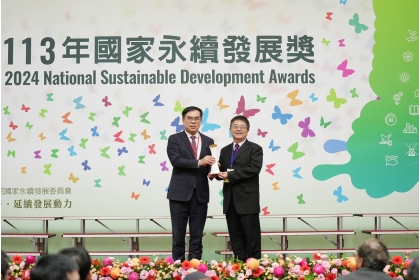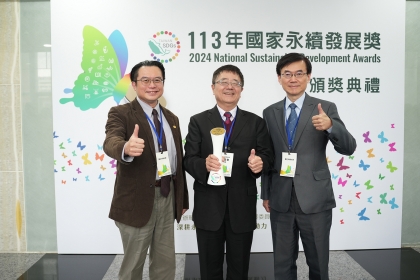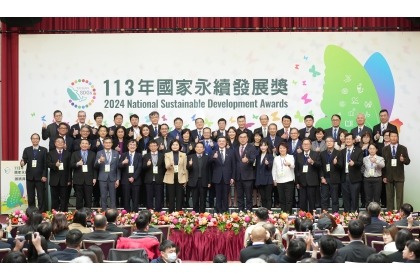NCHU Wins the National Sustainable Development Award
2024-12-23
興新聞張貼者
Unit秘書室
1,860
National Chung Hsing University (NCHU), renowned for having the most comprehensive natural carbon sink expertise and robust net-zero research capabilities in Taiwan, has been driving its ambitious transformation toward a 2040 net-zero campus. On December 19, NCHU was honored with the "2024 National Sustainable Development Award" by the Executive Yuan's National Council for Sustainable Development. Premier Jung-tai Cho personally attended the award ceremony, where President Fuh-Jyh Jan received the award on behalf of the university.
This year, the competition saw a record 162 organizations vying for recognition, with 22 institutions competing in the education category. Despite fierce competition, NCHU stood out with its exemplary sustainability achievements and innovative practices.
Leading in Sustainability Research
In the field of sustainability research, NCHU boasts 234 faculty members actively engaged in projects related to Taiwan's 12 net-zero strategies. According to the 2024 Times Higher Education Impact Rankings, which evaluate universities based on the United Nations’ Sustainable Development Goals (SDGs), NCHU ranked 43rd globally and 1st in Taiwan for SDG 15 (Life on Land), and 98th globally and 2nd in Taiwan for SDG 13 (Climate Action), showcasing its strong commitment to sustainable development.
Making a Mark in Social Contributions
Since the 1960s, NCHU has been at the forefront of social responsibility, starting with its pioneering overseas agricultural teams. Today, the university continues this legacy with its University Social Responsibility (USR) initiatives, including Taiwan's only Stray Animal Welfare program, as well as horticultural therapy, green drought-resilience projects, Indigenous community welfare, and environmental resilience programs. These initiatives encourage students to engage in hands-on fieldwork, earning widespread public acclaim.
Championing Environmental Sustainability
In environmental sustainability, NCHU has implemented greenhouse gas inventory systems, resulting in a remarkable 44.37% reduction in carbon emissions over the past decade. This achievement stems from measures such as upgrading energy-efficient equipment, optimizing lighting systems, installing smart meters, and revising electricity usage contracts.
Pioneering Innovative Models
NCHU has also set a precedent in innovation by establishing Asia's only Circular Economy Research Academy. In partnership with industries, the academy cultivates top-tier talent in key areas of the national circular economy. The university has developed a net-zero demonstration site at its Xixinba Ranch, featuring green energy infrastructure, resource recycling, and agricultural wastewater-to-hydrogen power systems. It also created a campus-wide carbon-neutral sandbox environment to scale these initiatives. By 2025, NCHU aims to achieve 50% net-zero emissions, increasing to 70% by 2035 and 100% by 2040. At its Nantou campus, NCHU is developing a net-zero university town with solar photovoltaic systems, charging stations, and a biomass gasification power system that uses local agricultural waste as fuel. The campus will also feature a 100% renewable energy smart microgrid capable of independent operation.
A Visionary Leader in Carbon Knowledge
President Fuh-Jyh Jan highlighted NCHU’s role as a vital knowledge hub for natural carbon sinks in Taiwan, spearheading advancements in the domains of soil carbon (yellow carbon), forest carbon (green carbon), and marine carbon (blue carbon). The university collaborates with government agencies to establish carbon sink methodologies and partners with industries to implement carbon sequestration accounting. Moreover, NCHU incorporates SDG concepts into its core curriculum for all students, aiming to deepen sustainability principles and provide Taiwan with transformative solutions and expertise for its net-zero transition.
This year, the competition saw a record 162 organizations vying for recognition, with 22 institutions competing in the education category. Despite fierce competition, NCHU stood out with its exemplary sustainability achievements and innovative practices.
Leading in Sustainability Research
In the field of sustainability research, NCHU boasts 234 faculty members actively engaged in projects related to Taiwan's 12 net-zero strategies. According to the 2024 Times Higher Education Impact Rankings, which evaluate universities based on the United Nations’ Sustainable Development Goals (SDGs), NCHU ranked 43rd globally and 1st in Taiwan for SDG 15 (Life on Land), and 98th globally and 2nd in Taiwan for SDG 13 (Climate Action), showcasing its strong commitment to sustainable development.
Making a Mark in Social Contributions
Since the 1960s, NCHU has been at the forefront of social responsibility, starting with its pioneering overseas agricultural teams. Today, the university continues this legacy with its University Social Responsibility (USR) initiatives, including Taiwan's only Stray Animal Welfare program, as well as horticultural therapy, green drought-resilience projects, Indigenous community welfare, and environmental resilience programs. These initiatives encourage students to engage in hands-on fieldwork, earning widespread public acclaim.
Championing Environmental Sustainability
In environmental sustainability, NCHU has implemented greenhouse gas inventory systems, resulting in a remarkable 44.37% reduction in carbon emissions over the past decade. This achievement stems from measures such as upgrading energy-efficient equipment, optimizing lighting systems, installing smart meters, and revising electricity usage contracts.
Pioneering Innovative Models
NCHU has also set a precedent in innovation by establishing Asia's only Circular Economy Research Academy. In partnership with industries, the academy cultivates top-tier talent in key areas of the national circular economy. The university has developed a net-zero demonstration site at its Xixinba Ranch, featuring green energy infrastructure, resource recycling, and agricultural wastewater-to-hydrogen power systems. It also created a campus-wide carbon-neutral sandbox environment to scale these initiatives. By 2025, NCHU aims to achieve 50% net-zero emissions, increasing to 70% by 2035 and 100% by 2040. At its Nantou campus, NCHU is developing a net-zero university town with solar photovoltaic systems, charging stations, and a biomass gasification power system that uses local agricultural waste as fuel. The campus will also feature a 100% renewable energy smart microgrid capable of independent operation.
A Visionary Leader in Carbon Knowledge
President Fuh-Jyh Jan highlighted NCHU’s role as a vital knowledge hub for natural carbon sinks in Taiwan, spearheading advancements in the domains of soil carbon (yellow carbon), forest carbon (green carbon), and marine carbon (blue carbon). The university collaborates with government agencies to establish carbon sink methodologies and partners with industries to implement carbon sequestration accounting. Moreover, NCHU incorporates SDG concepts into its core curriculum for all students, aiming to deepen sustainability principles and provide Taiwan with transformative solutions and expertise for its net-zero transition.




